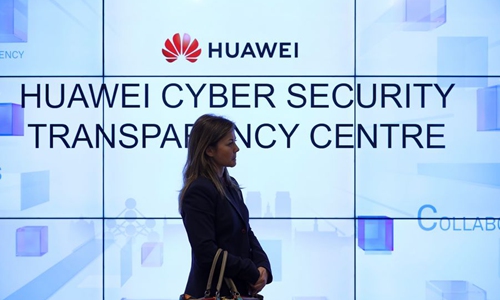HOME >> OPINION
EU’s pragmatic approach to Huawei defies US threats
By Dong Yifan Source:Global Times Published: 2020/2/20 19:55:17

A woman listens to a debate at Huawei Cyber Security Transparency Center in Brussels, Belgium, on Jan. 30, 2020.(Xinhua/Zhang Cheng)
At the 56th Munich Security Conference (MSC) held from Friday to Sunday in Munich, Germany. responding to a question about Huawei, Wolfgang Ischinger, Chairman of the MSC, said in an interview on February 10 that it is important to not implement protectionism under the pretext of national security. He also pointed out that Germany supports free trade. His remarks are a direct rejection of US attempt to prevent Huawei from constructing the 5G networks of its allies. This shows that European countries do not want to sacrifice their development interests, and the US alliance network cannot completely restrain Huawei's pragmatic cooperation with other countries.
Many European countries have decided they will not block Huawei from their 5G networks. On January 28, the UK said that it would not ban equipment made by Huawei from being used in its 5G construction despite US lobbying. The EU released its "5G toolbox" in January, in which it did not recommend any ban on equipment from a specific firm. On February 11, the ruling Christian Democratic Union of Germany supported a position paper on 5G mobile networks that did not call for imposing bans on suppliers. This shows European countries are taking a pragmatic approach to 5G issues.
The US suppression of Huawei is much too obvious. The US regards China as a strategic rival and has implemented technological blockades against China and decoupling of their economies. 5G communication is cutting-edge technology and is expected to bring transformative changes to various sectors. Naturally Huawei, the world's leading company in 5G, has become a US target. Washington has been unscrupulous in trying to prevent Huawei from obtaining 5G supply orders around the world.
The US continues to hype and fabricate Huawei's so-called potential security risks to try to force its allies to reject Huawei. Under the guidance of America First policy and great power competition, the US expects its allies to sacrifice their economic interests and diplomatic independence and become a pawn of the US containment of China.
Such US diplomacy has seriously undermined the EU's interests, and EU-US mutual trust. In addition to 5G, the US has also waved its big stick by imposing economic sanctions that threaten Europe on issues such as the Iran nuclear deal and the Nord Stream-2 pipeline between Russia and Germany. The US has forced Europe to give up its economic interests and has led Europe's diplomacy onto a track that the US has set up, seriously damaging Europe's autonomy and its relations with other countries. Thus, there has been an increasing call for changing the status quo in Europe. More people believe that EU diplomacy should more assertively defend its own interests and the rules-based concept of multilateralism, instead of blindly bowing to unilateral bullying. To this end, the EU needs more flexible policies to maneuver between major powers and strengthen solidarity in developing economic, military and foreign policies.
However, the starting point of Europe's economic and foreign policy is not to choose between China and the US, but to maximize its benefits based on changing circumstances. At present, Europe's defense and intelligence are still dependent on the US, and Europe's own defense integration cannot fill the potential gap caused by security decoupling. Meanwhile, Europe is aware that its digital economy and communications technology seriously lagged behind those of China and the US. Europe's mentality of self-improvement will also promote its local companies to further participate in 5G construction. The EU will attach great importance to global telecom equipment makers Nokia and Ericsson in the global 5G landscape.
Therefore, we still need to see the subtlety in Europe's attitude toward 5G: It will somehow yield to the US as well as try to increase the competitiveness of its own companies. Thus, while it hasn't refused to completely block Huawei it doesn't mean Europe has opened the door widely for Huawei. Huawei's success in the European market still requires quality, cost-effectiveness and mutual trust with European governments and enterprises. But all in all, the US military cooperation network cannot restrict its allies or limit Huawei.
The author is a research fellow with the Institute of European Studies, China Institutes of Contemporary International Relations. opinion@globaltimes.com.cn
Posted in: VIEWPOINT